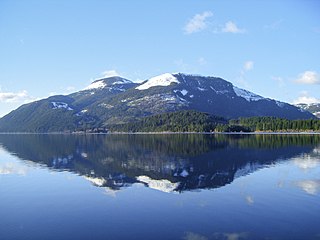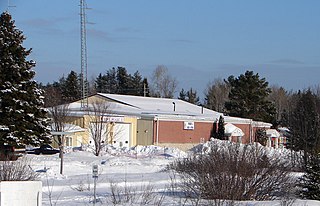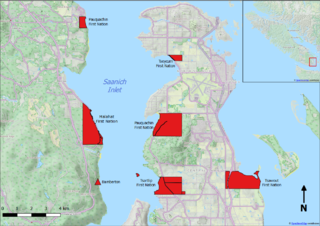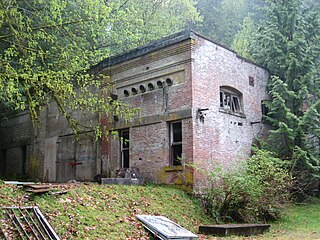External links
Coordinates: 48°48′30″N124°07′28″W / 48.80839°N 124.124393°W / 48.80839; -124.124393
| | This article about a location on the Coast of British Columbia, Canada is a stub. You can help Wikipedia by expanding it. |
Mesachie Lake is an unincorporated community in the Cowichan Valley region of Vancouver Island, British Columbia, Canada. It lies on the south shore of Cowichan Lake, British Columbia. The name is from the Chinook Jargon for "bad, evil, naughty". It was founded in 1942 by the Hillcrest Lumber Company, which built houses for its workers and their families. This company also planted many non-native fruit and shade trees which have since been given heritage status.
In 1942, houses from Sahtlam were cut into pieces and shipped via rail cars and then reassembled in Mesachie Lake with most houses there today having at least part of the original houses still being used.
The mill was completely new in design, with more efficient modern equipment. The powerhouse was completed and the generators installed. The powerhouse was able to produce enough power not only for the mill and the community, but on occasion supplied the village of Lake Cowichan when its own plant was overloaded or broken down.
In 1982, Camp Imadene bought the old Hillcrest site and moved their camp in a decade later.
Mesachie Lake is still a vibrant community, although the school and church have been moved to Lake Cowichan. The Mesachie Skydome is home to many ball tournaments. The community hall hosts various events throughout the year. The town has its own post office and public boat launch. The original Hillcrest Lumber Company office is now a private residence, along with all of the houses once owned by workers at the mill.
Coordinates: 48°48′30″N124°07′28″W / 48.80839°N 124.124393°W
Chinook Jargon is a language originating as a pidgin trade language in the Pacific Northwest, and spreading during the 19th century from the lower Columbia River, first to other areas in modern Oregon and Washington, then British Columbia and parts of Alaska, Northern California, Idaho and Montana while sometimes taking on characteristics of a creole language. It is partly descended from the Chinook language, upon which much of its vocabulary is based. Approximately 15 percent of its lexicon is French, and it also makes use of English loanwords and those of other language systems. Its entire written form is in the Duployan shorthand developed by French priest Émile Duployé.

Duncan is a city on southern Vancouver Island in British Columbia, Canada. It is the smallest city by area in Canada.

Crofton is a small west coast town within the District of North Cowichan of southern Vancouver Island in British Columbia. This ferry terminal lies east of BC Highway 1 about 74 kilometres (46 mi) north of Victoria.

The Cowichan Valley Regional District is a regional district in the Canadian province of British Columbia is on the southern part of Vancouver Island, bordered by the Nanaimo and Alberni-Clayoquot Regional Districts to the north and northwest, and by the Capital Regional District to the south and east. As of the 2011 Census, the Regional District had a population of 80,332. The regional district offices are in Duncan.

Cowichan Lake is a large freshwater lake located on southern Vancouver Island, British Columbia, Canada. It is located along the Cowichan Valley in the Cowichan Valley Regional District, with its eastern shore about 28 km (17 mi) west of Duncan, British Columbia. Cowichan Lake is about 30 km (19 mi) in length, running mostly from west to east, and is about 4 km (2.5 mi) wide at its widest point. The lake is also the source of the Cowichan River.

The BC Forest Discovery Centre, located in Duncan, chronicles the history of logging in British Columbia, Canada. It is a 100-acre (40 ha) site with 2.5 km of operational 3 ft narrow gauge railway.

Ruskin is a rural, naturally-treed community, about 35 mi (56 km) east of Vancouver on the north shore of the Fraser River. It was named around 1900 after of the English art critic, essayist, and prominent social thinker John Ruskin.

Shawnigan Lake is the name of a village on British Columbia's Vancouver Island. The name Shawnigan is an adaptation of the Hul'qumi'num name Showe'luqun, for the lake and the village. It is part of Electoral Area B in the Cowichan Valley Regional District. As of 2016, the permanent population of Shawnigan Lake is 8,558.

Nairn and Hyman is a township in the Canadian province of Ontario. The township, located in the Sudbury District, borders on the southwestern city limits of Greater Sudbury west of the city's Walden district. The township had a population of 342 in the Canada 2016 Census.

Bamberton is an industrial site located on the Saanich Inlet, just south of Mill Bay, around 45k kilometres north of Victoria on Vancouver Island.

Cultus Lake is a lake, associated community and provincial park in the Fraser Valley region of British Columbia, Canada. It is the source of the Sweltzer River. The lake itself is warm, and the area has become a popular recreation destination with ample opportunities for fishing, water skiing, wind surfing, wakesurfing, kayaking, standup paddle-boarding and hiking. Cultus Lake is located 11 kilometers (6.8 mi) south of the Chilliwack River, near the city of Chilliwack and approximately 80 kilometers (50 mi) east of Vancouver. In 1950, Cultus Lake became a Provincial park of British Columbia. Cultus Lake covers an area of 656 hectares, evenly on either side of the lake. At one time the lake had a sawmill and booming ground until it became a provincial park in the 1950s.

Mill Bay is a commuter town of about 3,200 people located on Vancouver Island, British Columbia, Canada about 30 km (19 mi) north of Victoria, the capital. It is part of the Cowichan Valley Regional District.

Pequaming is an unincorporated community in L'Anse Township of Baraga County in the U.S. state of Michigan. It is located on a narrow point of land that juts into Keweenaw Bay. Although still partially inhabited, Pequaming is one of the largest ghost towns in the Upper Peninsula of Michigan.

Charlton and Dack is a municipality in the Canadian province of Ontario, located within the Timiskaming District. Its population in 2016 was 686.
CICV-FM was a community radio station that broadcasts on the frequency 98.7 FM in Lake Cowichan, British Columbia, Canada.
Bill Routley is a Canadian politician, who was elected as a Member of the Legislative Assembly of British Columbia in the 2009 provincial election. A member of the BC New Democratic Party, he was elected to represent the riding of Cowichan Valley. In the 39th Parliament, with his party forming the official opposition, Routley acted as the deputy critic for forests and range.

The Goldstream Powerhouse is a decommissioned hydroelectric plant located near Goldstream Provincial Park in Langford, near Victoria, British Columbia. This plant provided electricity to Victoria for 60 years and is one of the little-known and ingenious chapters in the history of Victoria. This plant was one of the first hydro plants of this type on the west coast of North America. The structure is over a century old and is unsafe to inhabit. It is within the boundaries of the watershed lands owned by the CRD and is inaccessible to the public due to its proximity to a drinking water reservoir.

Cowichan was a steamship which was operated in British Columbia under the ownership of the Union Steamship Company. Cowichan sank in 1925 following a collision with another ship.

Paldi is a former South Asian settlement and mill town near Duncan, on Vancouver Island in British Columbia. It is significant as a town founded by Sikh Canadians, and its early exemplification of multiculturalism.

Brooks-Scanlon Lumber Company was a lumber products company with large sawmills and significant land holdings in Minnesota, Florida, British Columbia, and Central Oregon. The company was formed in 1901 with its headquarters in Minneapolis, Minnesota. Beginning in 1915, its main lumber production facility was in Bend, Oregon. For many years, its Bend sawmill was one of the largest lumber producers in the world. In 1969, the company created Brooks Resources to broaden its business base beyond timber production. Brooks-Scanlon's Bend sawmill was closed in 1994. Today, Brooks Resources is the only vestige of the company that is still in business.